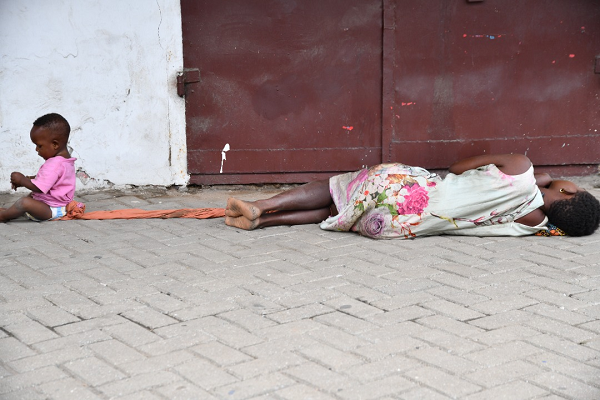
Increase investment in mental care - CSO
The government has been urged to scale up its investment in mental health to reap the desired results.
Ghana spends just 1.4 per cent of total government health expenditure on mental health and so the burden of mental ill health continues to grow, with serious consequences for the country’s economic and social development, a civil society organisation (CSO), Ghana Somubi Dwumadie (Ghana participation programme), has observed.
Making a case for mental health funding in a position paper, titled: “Why Ghana needs to invest more in mental health”, the CSO said funds were urgently needed to implement mental health legislation and scale up the implementation of the country’s mental health policies and strategies.
It further said scaling up funding for the sub-sector would enable the Mental Health Authority (MHA) to fulfill its mandate to provide culturally appropriate, humane and integrated mental health care throughout the country.
Law
Ghana Somubi Dwumadie said the country had a comprehensive Mental Health Law (2012) that had been praised by the World Health Organisation (WHO) as an example for other countries for its focus on integrated, community-based approaches and framing access to care as a human right.
“However, while the legal and the policy frameworks exist to improve mental health services, implementation remains a challenge. The majority of people with mental health conditions in Ghana – between 85 and 98 per cent – either cannot or do not access the treatment they require,” it said.
Cost, benefit
A comparison of the cost of and benefits from treating mental health conditions in Ghana, it said, was done for the first time by Nonvignon, Amissah & Agyemang in 2020, commissioned by the Ghana Priorities Project, a collaboration between the National Development Planning Commission and the Copenhagen Consensus Centre.
It said the authors estimated that for every GH¢1 invested in screening for and treating depression, anxiety and schizophrenia, a significant return on investment would be gained.
It explained that a GH¢1 investment in depression would result in a GH¢7 return, while a GH¢1 investment in anxiety would lead to a GH¢5 return, with a GH¢1 investment in schizophrenia yielding a GH¢2 return.
“These findings reflect similar conclusions drawn by Chisholm and colleagues in 2016 from a ground-breaking, multi-country study on the cost of and benefits from providing more, better quality mental health services,” it said.
External financing
The paper indicated that donor funding for health was predicted to decline sharply in Ghana, linked to the country’s transition to a lower middle-income country (LMIC) status in 2011 and the 2019 Ghana Beyond Aid Charter.
That, it said, was part of a wider pattern of reduction in aid flows, “which are under additional pressure due to the global economic downturn and the COVID-19 pandemic. Domestic funding for health and mental health is urgently needed to compensate for this reduction”.
“Poor mental health is strongly linked to chronic and inter-generational poverty in a vicious circle effect. Globally, evidence shows up to twice the levels of depression and anxiety among low-income groups than among those who are better off.
“In Ghana, it is estimated that household costs associated with poor mental health account for as much as a third of total monthly earnings.
These costs include the direct cost of accessing treatment, such as medicines, fees for health services and transport, as well as indirect cost from the loss of earnings,” it said.
Ghana’s recent economic growth, it said, had been accompanied by rising inequality, noting that poverty levels everywhere were expected to increase due to the COVID-19 pandemic.
“Investing in mental health will support the government’s poverty reduction efforts, enabling individuals to participate more effectively in society and the economy, enabling stronger economic growth,” Ghana Somubi Dwumadie said.
Population health
Across the world, the statement said mental health conditions accounted for a growing proportion of the overall burden of disease, adding that depression in particular had been slowly climbing the list of health problems that caused the most disability for several decades and was a major challenge for Ghana.
“The COVID-19 pandemic is contributing to rising levels of depression, anxiety, harmful alcohol and drug use, self-harm and suicidal behaviours.
Improved mental health can lead to reduced tobacco, alcohol and substance abuse, reduced vulnerability to infectious diseases such as HIV and tuberculosis (TB) and reduced obesity and chronic health conditions,” it said.
The NGO said about half of people with TB had depression, making them 10 times more likely to stop treatment, contributing to increased drug resistance and leaving them at higher risk of dying.
“Importantly, better mental health also enhances overall well-being and improves social connections,” it said.
The CSO said in Ghana, as in other countries, mental illness was associated with high levels of repeat health service utilisation and associated costs as a result of chronic mental health conditions, and that high returns on investing in mental health also came from lower overall
healthcare costs and reduced pressure on the health system.
Survey
Ghana has inadequate infrastructure and funding to manage mental health, leading to a surge in severe cases, many of whom had become homeless.
Inadequate state funding has been largely blamed for worsening mental health cases in the country.
The latest survey on mentally ill persons was carried out about six years ago when the MHA conducted a random rapid assessment of patients on the streets in the whole country.
It found about 15,000 mental patients on streets across the country, with about 1,600 such patients in Accra and Tema alone.
